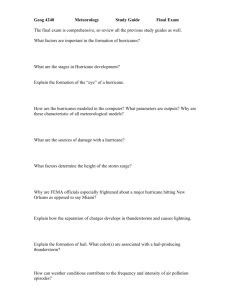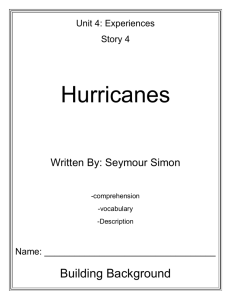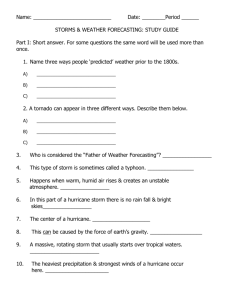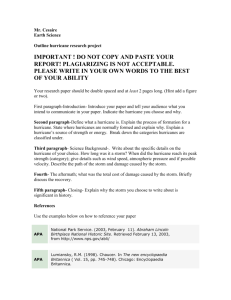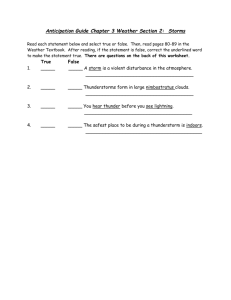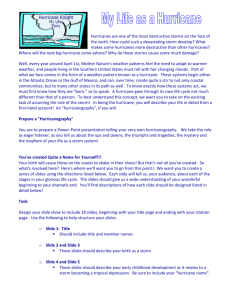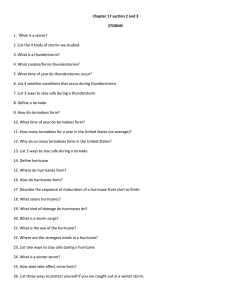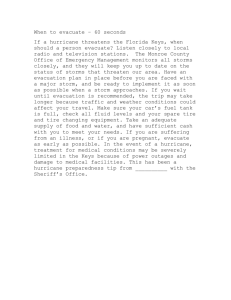The following article was released by the University of Houston,... Media Ltd., and available through LexisNexis on Wednesday, June 1,...
advertisement
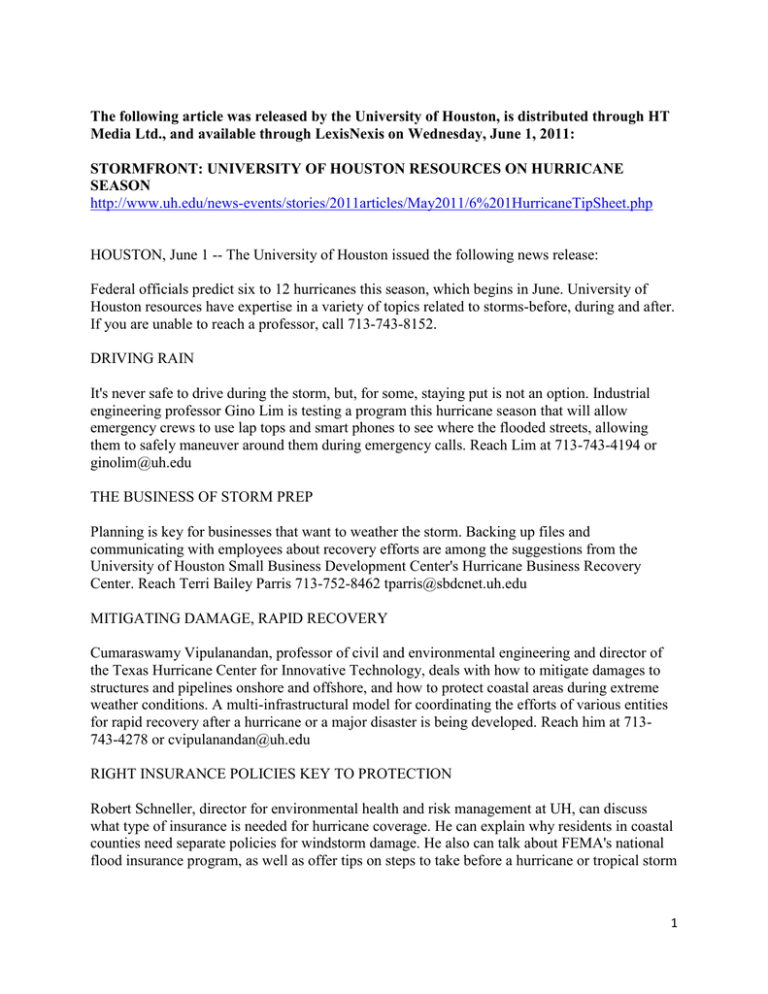
The following article was released by the University of Houston, is distributed through HT Media Ltd., and available through LexisNexis on Wednesday, June 1, 2011: STORMFRONT: UNIVERSITY OF HOUSTON RESOURCES ON HURRICANE SEASON http://www.uh.edu/news-events/stories/2011articles/May2011/6%201HurricaneTipSheet.php HOUSTON, June 1 -- The University of Houston issued the following news release: Federal officials predict six to 12 hurricanes this season, which begins in June. University of Houston resources have expertise in a variety of topics related to storms-before, during and after. If you are unable to reach a professor, call 713-743-8152. DRIVING RAIN It's never safe to drive during the storm, but, for some, staying put is not an option. Industrial engineering professor Gino Lim is testing a program this hurricane season that will allow emergency crews to use lap tops and smart phones to see where the flooded streets, allowing them to safely maneuver around them during emergency calls. Reach Lim at 713-743-4194 or ginolim@uh.edu THE BUSINESS OF STORM PREP Planning is key for businesses that want to weather the storm. Backing up files and communicating with employees about recovery efforts are among the suggestions from the University of Houston Small Business Development Center's Hurricane Business Recovery Center. Reach Terri Bailey Parris 713-752-8462 tparris@sbdcnet.uh.edu MITIGATING DAMAGE, RAPID RECOVERY Cumaraswamy Vipulanandan, professor of civil and environmental engineering and director of the Texas Hurricane Center for Innovative Technology, deals with how to mitigate damages to structures and pipelines onshore and offshore, and how to protect coastal areas during extreme weather conditions. A multi-infrastructural model for coordinating the efforts of various entities for rapid recovery after a hurricane or a major disaster is being developed. Reach him at 713743-4278 or cvipulanandan@uh.edu RIGHT INSURANCE POLICIES KEY TO PROTECTION Robert Schneller, director for environmental health and risk management at UH, can discuss what type of insurance is needed for hurricane coverage. He can explain why residents in coastal counties need separate policies for windstorm damage. He also can talk about FEMA's national flood insurance program, as well as offer tips on steps to take before a hurricane or tropical storm 1 hits and what to do after if property damage is sustained. Reach him at 713-743-5868 or rdschneller@uh.edu FOOD AND WATER SAFETY WHEN POWER IS OUT After the storm, how long can food stay fresh when the power is out? What can you do to protect food in your freezer? Jay Neal and Nancy Graves, both professors with the Conrad N. Hilton College of Hotel and Restaurant Management, can answer questions about food and water safety in the event of an extended power outage. Reach Graves at 713-743-2426 or nsgraves@central.uh.edu and Neal at 713-743-2652 or jneal@central.uh.edu LEGAL MATTERS ASSOCIATED WITH STORMS Richard Alderman with the UH Law Center can discuss topics such as price gouging before hurricanes and consumer complaints about repairs, landlords, insurance issues and other legal matters involving damage to homes, trees and businesses in the aftermath of a storm. Reach him at 713-743-2165 or ralderman@central.uh.edu KEEPING ANXIETIES AT BAY For many Houston-area residents who survived Hurricane Ike, another round of storms brings with it another round of anxieties. Peter Norton, a clinical psychologist and associate professor who runs UH's Anxiety Disorder Clinic, works on the front lines of treatment and research. Reach him at 713-743-8675 or pnorton@uh.edu The Economics of Disaster Relief Thomas DeGregori, professor of economics, has written the article "The Do's and Don'ts of Disaster Relief," which can be found at http://www.acsh.org/factsfears/newsID.630/news_detail.asp. He is an economic development expert, and has written about and been an adviser on disaster relief. Reach him at 713-743-3838 or trdegreg@uh.edu SALT MARSH EXPERT Steven Pennings, a professor in UH's department of biology and biochemistry, is an expert in community ecology and conducts his research in the coastal wetlands. Pennings also is conducting research on the impact of sea level rise and erosion on coastal salt marshes. He is available to discuss hurricane damage to coastal wetlands. He can be reached at 713-743-2989 spennings@uh.edu 2 HURRICANE CSI: IDENTIFYING STORM REMAINS THROUGH ANCIENT CLIMATE RECORDS Don Van Nieuwenhuise is director of the Professional Geosciences Program. A recently completed study used high-tech sediment analysis and microfossils to identify hurricanes in Laguna Madre sediments from an unnamed hurricane in 1933, Hurricane Beulah (1967) and Hurricane Allen (1980). This technology is being developed to identify subtle hurricane deposits that can be used to determine climate cycles before 1850. Reach him at 713-743- 3423 or donvann@uh.edu HOTELS AS A PORT IN THE STORM Fernando Cuellar, general manager of the Hilton University of Houston, has 40 years of experience in the industry. He rode out Hurricane Rita in 2005 as the general manager of the Renaissance Hotel in Greenway Plaza with 185 guests and employees, as well as 30 pets. He helped make a shelter out of one of the ballrooms, supplying it with bottled water and snacks, where they waited till the winds died down. In 2008, he weathered Hurricane Gustav in New Orleans as the general manager of the Marriott Hotel in Metairie, by Lake Pontchartrain, where he also hosted several police officers from the parish and the Army Corp of Engineers. Reach him at 713-743-2435 or cfcuella@central.uh.edu GIVE US YOUR TIRED, YOUR WEARY: SHELTER FROM THE STORM In times of crisis the hospitality industry recognizes a responsibility to those escaping the storm. Carl Boger, associate dean of academic programs for the Conrad N. Hilton College of Hotel and Restaurant Management, can address how hotels manage the crisis for the weary traveler. Reach him at 713-743-2610 or cboger@central.uh.edu WORTH HIS SALT: STORM CHASER TACKLES HURRICANES James Lawrence, UH associate professor of geosciences, has developed an innovative device to measure the salt content of rain while flying through tropical storms and hurricanes. Lawrence's research is aimed at understanding how extra heat derived from sea spray enhances the development of the dangerous Category 3 to 5 hurricanes. The instrument was developed for use on the National Oceanic and Atmospheric Administration (NOAA) P3 research aircraft. For more information, contact Lisa Merkl at 713-743-8192 or lkmerkl@uh.edu to be connected with Lawrence. WHAT TO DO ABOUT WORK IN CASE OF CRISIS Holly Hutchins, UH assistant professor of human development and consumer science, can discuss the effects a hurricane will have on employees, such as maintaining contact with employers and what to do when their place of employment has been destroyed. She also can address issues that face employers, including the areas of crisis management training and postcrisis learning. Reach her at hmhutchins@uh.edu or 713-743-8153. For any query with respect to 3 this article or any other content requirement, please contact Editor at htsyndication@hindustantimes.com 4
